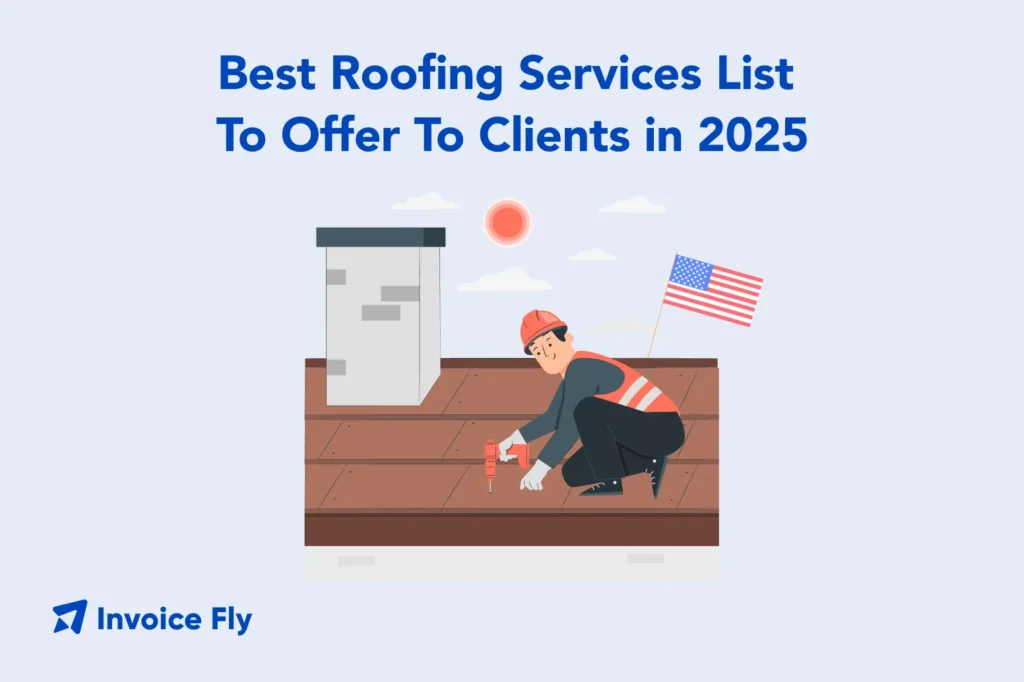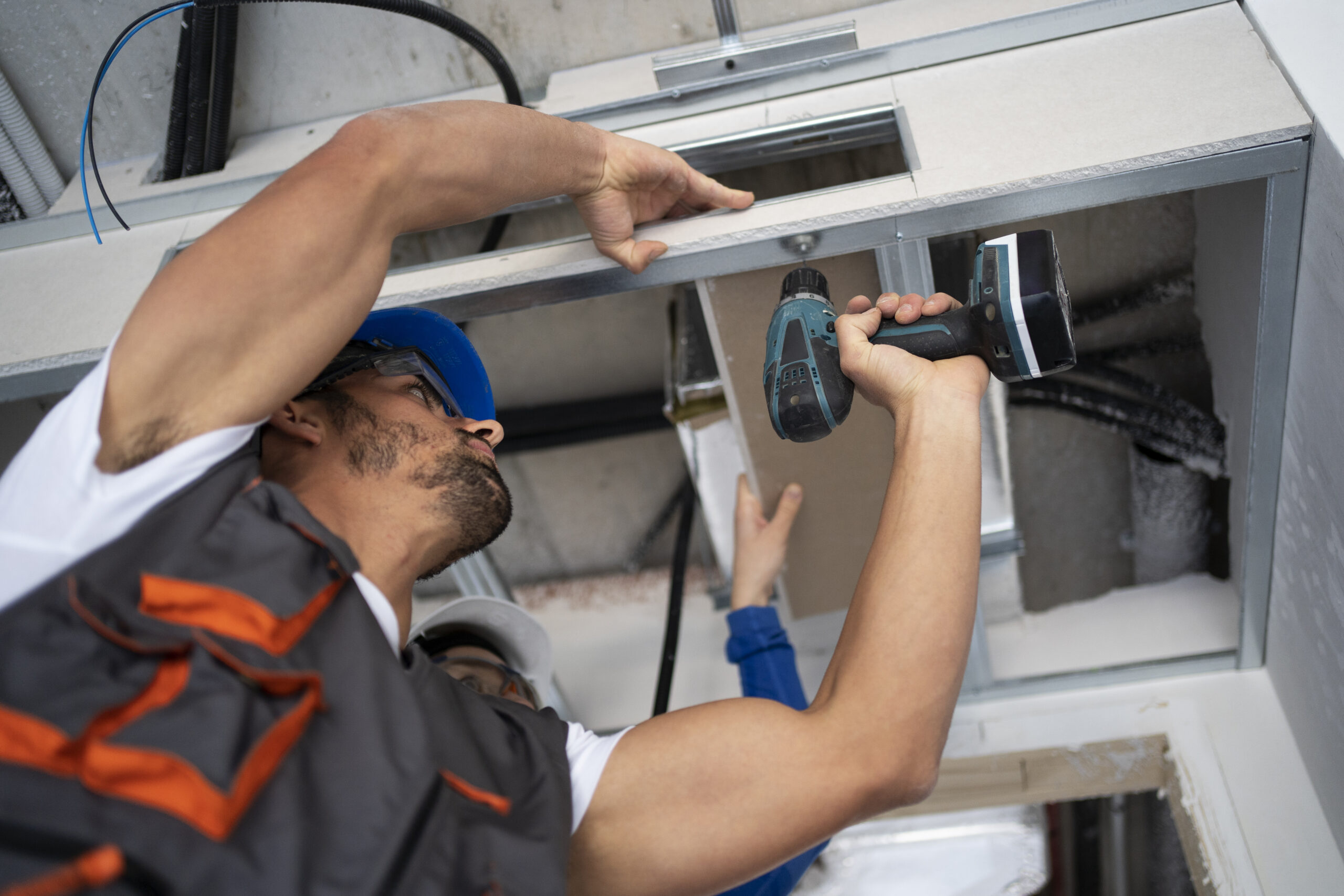Top Roofing Services List To Offer Clients in 2025

Table of Contents
Building a successful roofing business takes more than knowing how to install shingles. Today’s property owners want full-service solutions—quick fixes, long-term protection, and upgrades that boost their home or building’s value. Whether you’re starting fresh or growing your roofing company, offering the right mix of roofing services is what separates the pros from the rest. Bundle your services to attract more customers.
The roofing industry in 2025 is growing fast. New materials, modern roofing systems, and rising customer expectations make it important to offer services that meet a range of needs, from routine roof cleaning to flat roof installation and insurance help.
This guide breaks down the most in-demand and profitable roofing services you should consider. By the end, you’ll have a clear service list to grow your business and better serve your customers.
If you’re just getting started, also check out our guide on how to start a roofing company to build a strong foundation from day one.

Define Your Roofing Service List and Pricing Strategy
A clear, well-thought-out roofing service list helps customers understand what you offer. And it makes it easier for them to hire you. Whether they need shingle roof maintenance, full roof replacement, or help with insurance claims, knowing you offer those services puts you ahead of the competition.
It also helps you run your business smarter. Instead of trying to do everything, you can focus on your strongest services. That leads to better marketing, higher profits, and more satisfied customers.
Just as important is having a solid roofing pricing strategy. Pricing varies depending on the service, material, and labor. If you know your costs—materials, labor, insurance, equipment—you can stay competitive without cutting into your profits.

Roofing Service List for Your Roofing Business
1. Roof Replacement Services
This is one of the most profitable services in the roofing industry. It involves removing the old roof and installing a completely new roofing system including underlayment, decking repairs, and shingles or another material.
Mike from Denver built his business around quality roof replacements. His team completes about 50 projects a year, mostly through word-of-mouth and repeat clients.
Ideal for: Residential and commercial roofing
Materials: Asphalt shingles, metal, tile, commercial roofing material
2. Roof Repair Services
Not all roofs need replacing. Repairs can include patching leaks, replacing flashing, or fixing damaged shingles. They’re quicker, more affordable for clients, and great for building trust.
Pro tip: Offer 24/7 emergency repairs for higher rates during storms or after severe weather.
Profit booster: Builds long-term client relationships and leads to replacements later
3. Roof Maintenance Services
Preventive care saves clients money and keeps their roofs in top shape. Offer seasonal shingle roof maintenance, cleaning, debris removal, and minor fixes.
Annual service plans provide recurring revenue and help you spot issues before they become big repairs.
Good for: Residential and commercial flat roof maintenance
4. Roof Installation Services (New Construction)
If you work with builders or developers, offering full roof installation is key. This includes working on properties that don’t yet have roofing in place.
Scheduling is more predictable, and strong relationships with developers can lead to long-term contracts.
Skills needed: Blueprint reading, timing coordination, flashing and vent integration

5. Roof Inspection Services
Inspections are great entry-point services. Whether it’s for a home sale, insurance, or general maintenance, this service requires fewer tools but strong roofing knowledge.
Inspections often lead to repair or replacement jobs.
Add-on service: Include after storms, before real estate closings
Bonus: Partner with real estate agents or insurance adjusters
6. Roof Siding Services
Adding siding is a natural next step for many roofing businesses. Storm damage often affects both, and many clients want to fix everything at once.
Sarah from Texas added siding and now makes 30 percent of her revenue from it—often upsold alongside roofing jobs.
Materials: Vinyl, wood, fiber cement
Customer win: One contractor = one solution
7. Roof Coating and Sealing Services
Roof coating extends roof life, especially on flat roofs and commercial buildings. It’s ideal for clients who aren’t ready to fully replace their roof.
Sealing around joints and problem areas also prevents leaks.
High-margin service: Especially with quality coatings
Bonus: Reflective coatings improve energy efficiency
8. Skylight Installation and Repair Services
Skylights require waterproofing knowledge and integration with the roofing system. They add natural light and boost property value.
Great upsell: During full roof replacements or new construction
Profit tip: Offer leak repair for older skylights
9. Window Inspection / Repair Services
Roofers often spot window issues during roof work. Offering simple window inspections and small repairs adds value and positions you as a full-service exterior pro.
Good fit: With siding and storm repair services
Low material cost = higher margin
10. Roof Ventilation Solutions
Roofing and ventilation go hand in hand. Poor ventilation causes rot, mold, and shortened shingle life.
Services include ridge vent installs, attic fans, and soffit upgrades.
Add-on: With roof repairs or replacements
Bonus: May qualify for energy rebates

11. Gutters and Downspouts Installation
Gutters protect foundations and prevent water damage. Offer cleaning, installation, repairs, and seamless gutter systems.
Recurring revenue: Offer seasonal gutter cleaning
Tool tip: Invest in a gutter machine for higher profits
12. Commercial Roofing
Commercial roofing uses different materials (like TPO, EPDM, metal) and often involves flat roof systems. Projects are bigger, margins are higher, but licensing and insurance requirements are stricter.
Good long-term growth: Office buildings, warehouses, retail
Bidding tip: Build relationships with property managers and general contractors
13. Insurance Claims Assistance
Storm damage is on the rise. Helping clients navigate insurance claims can set your business apart.
Contractors who understand the claims process can help customers get faster approvals—and win more trust.
Great after storms: Especially in high-claim areas
Bonus: Offer emergency tarping and documentation
Most Common Roofing Services (And How to Sell Them)
Here are the most common roofing services homeowners look for and tips on how contractors can present them in a way that builds trust, shows value, and helps close more jobs.
Roof Repair Services
Here are some of the most common issues customers ask roofers to fix.
These problems usually need quick attention to prevent bigger damage:
- Leaks and water spots
- Missing or damaged shingles
- Storm or wind damage
- Clogged or broken gutters
- Worn or cracked flashing
These are the repairs roofers handle most often to keep homes safe and dry.
Emergency Roof Repair Services
Emergency roof repair services are for situations that need fast attention, like sudden leaks or storm damage. Homeowners often call when they’re stressed and need quick help, so being ready to respond can make a big difference. Common emergency requests include:
- Severe leaks during heavy rain
- Damage from fallen branches
- Missing shingles after strong winds
- Sudden roof punctures or holes
- Water pooling on flat roofs
These urgent fixes help protect the home right away and can lead to long-term repair or replacement work for contractors.
Professional Roof Cleaning Services
Professional roof cleaning services remove dirt, moss, algae, and debris that can damage roofing materials over time. A clean roof not only looks better but also lasts longer and stays safer during storms. For contractors, offering professional cleaning is a great way to provide extra value, prevent future repairs, and build strong relationships with homeowners.
Roof Washing Service
Roof washing services are an important service that helps keep a roof clean, safe, and long-lasting. Many homeowners don’t realize that moss, algae, and debris can weaken roofing materials over time. Offering roof washing can help contractors stand out, since it prevents damage and reduces the need for future repairs.
It’s also a great add-on service during inspections or maintenance visits, giving contractors an easy way to increase value for customers while boosting their own service offerings.
Roof Waterproofing Service
Roof waterproofing services help protect a home from leaks and long-term moisture damage. By adding special sealants or coatings, contractors can strengthen a roof’s ability to handle heavy rain, snow, and standing water.
This service is especially useful for older roofs or flat roofing systems that are more likely to collect moisture. For contractors, offering waterproofing is a smart way to extend the life of a roof, reduce future repair calls, and provide customers with greater peace of mind.
Roof Coating Services
Professional roof coating services add an extra protective layer to the roof, helping it last longer and perform better. Coatings can reflect sunlight, reduce heat absorption, and seal small cracks or gaps that could lead to leaks. They’re especially useful for flat or low-slope roofs, where standing water can cause damage over time.
For contractors, offering roof coatings is a great way to extend roof life for customers, improve energy efficiency, and create recurring maintenance opportunities.
Roof Drain and Gutter Cleaning Service
Roof drain cleaning services help prevent clogs that can lead to standing water, leaks, and structural damage. Leaves, dirt, and debris often build up in drains, especially on flat roofs, blocking the flow of water. Regular cleaning keeps the drainage system working properly and protects the roof during heavy rain.
For contractors, offering drain cleaning is an easy add-on service that boosts customer satisfaction and reduces the risk of costly emergency repairs.
Managing Your Roofing Business Operations
Offering great services isn’t enough. You also need to run your roofing company like a pro.
That means:
- Creating clear estimates
- Tracking labor, material, and equipment costs
- Sending professional invoices
- Managing permits and insurance
A tool like Invoice Maker can help you send polished, accurate invoices that build trust and help you get paid faster.
Also, don’t forget these essentials:
- Get licensed in your state
- Get insured to protect your business
- Choose a smart company name that matches your brand
- Use the right roofing tools to work safely and efficiently
- Check out the roofer salary guide if you’re hiring

How To Start Your Roofing Business?
Success in the roofing industry takes more than just knowing how to lay shingles. It comes from offering the right mix of services, pricing them correctly, and backing everything up with solid business practices.
Start small if you need to. Repairs, maintenance, and residential work are great entry points. These services help you build trust, gain experience, and generate steady income. As your skills grow, you can expand into bigger jobs like full roof replacements, commercial projects, or specialty services like coatings and ventilation.
What really sets great roofing companies apart is how they run their business. That means showing up on time, communicating clearly, using professional invoices, and always delivering what you promise. Customers notice, and they refer.
With the right service list, tools, and mindset, you can build a roofing brand that stands strong for years to come.
Want to lay the foundation for long-term success? Check out our full guide on how to start a roofing company for step-by-step advice.

Final Thoughts
Start with what you know—simple repairs, roof maintenance, or residential replacements—and build from there. As your experience and confidence grow, you can expand into commercial roofing, specialty services, or long-term maintenance contracts.
The most trusted roofing businesses stand out because they do the basics well: clear communication, dependable service, and consistent results. When you combine strong technical skills with organized business operations, you create a roofing brand that customers remember and recommend.
Keep learning, stay focused on quality, and build your services around what your market needs. With the right approach, your roofing business won’t just survive—it’ll thrive for years to come.
FAQs about Roofing Services
Most roofing jobs range from $5,000 - $15,000, depending on materials, size, and labor.
Roofers typically charge $50 - $150 per hour, based on experience and location.
Insurance usually covers roof damage caused by sudden, accidental events (like storms), but not wear-and-tear or lack of maintenance.
Yes, most roofing contractors offer free, no-obligation estimates.
A 2,000 sq. ft. roof generally costs $8,000 - $20,000, depending on material choice and project complexity.
